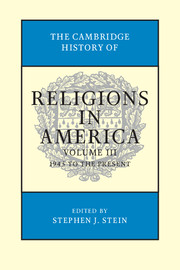Book contents
- Frontmatter
- SECTION I THE POSTWAR RELIGIOUS WORLD, 1945 AND FOLLOWING
- SECTION II CONTROVERSIAL ISSUES IN TRANSITIONAL TIMES
- SECTION III THE WORLD’s RELIGIONS IN AMERICA
- SECTION IV RELIGIOUS AND CULTURAL CONFLICT IN AMERICA
- SECTION V NEW AND CONTINUING RELIGIOUS REALITIES IN AMERICA
- SECTION VI CONCLUDING ESSAYS
- 34 Religion and Myths of Nationhood in Canada and Mexico in the Twenty-First Century
- 35 America’s Divided Soul, 2000–2009
- 36 Global Religious Realities in the United States
- 37 Visions of the Religious Future in the United States
- Index
- References
35 - America’s Divided Soul, 2000–2009
from SECTION VI - CONCLUDING ESSAYS
Published online by Cambridge University Press: 28 July 2012
- Frontmatter
- SECTION I THE POSTWAR RELIGIOUS WORLD, 1945 AND FOLLOWING
- SECTION II CONTROVERSIAL ISSUES IN TRANSITIONAL TIMES
- SECTION III THE WORLD’s RELIGIONS IN AMERICA
- SECTION IV RELIGIOUS AND CULTURAL CONFLICT IN AMERICA
- SECTION V NEW AND CONTINUING RELIGIOUS REALITIES IN AMERICA
- SECTION VI CONCLUDING ESSAYS
- 34 Religion and Myths of Nationhood in Canada and Mexico in the Twenty-First Century
- 35 America’s Divided Soul, 2000–2009
- 36 Global Religious Realities in the United States
- 37 Visions of the Religious Future in the United States
- Index
- References
Summary
Despite expectations to the contrary, Americans entered the twenty-first century with remarkably little fanfare. A new century – overlapping with a new millennium – might conceivably have aroused considerable hoopla about a new global world in the making or, to the contrary, apocalyptic scenarios about end-times soon to occur; but except for buzz about a possible Internet collapse due to user overload at the time, nothing much happened. But the calm was short-lived. George W. Bush’s election in 2000 had marked a clear break from the earlier Clinton years, ushering in a more conservative era, politically and religiously. According to the polls, early on, roughly half of all Americans were a bit uneasy with his God-and-country rhetoric, but after 11 September 2001, this was of less concern. The impact of 9/11 was, of course, immediate and immense. Aside from shock and fear, it had two major religious consequences: one, public consciousness of the presence of Muslims in the United States greatly increased; and, two, Americans realized as never before how politics, economies, and faith traditions were all deeply intertwined in a global world, and in ways that were neither well understood nor predictable.
This essay traces the shifting alignments of religion and politics in the United States during the first decade of this century. First, we look at these shifts for the nation as a whole, then second, at their regional variations. While some attention is given to presidential voting patterns, primarily the focus is upon the “softer” cultural aspects of the religion-and-politics nexus – the mythic, ritual, narrative, and symbolic realities. These encompass a wide spectrum of emotions, perceptions, and interpretive frames defining the nation’s identity, its meaning, and its purpose.
- Type
- Chapter
- Information
- The Cambridge History of Religions in America , pp. 746 - 765Publisher: Cambridge University PressPrint publication year: 2009



